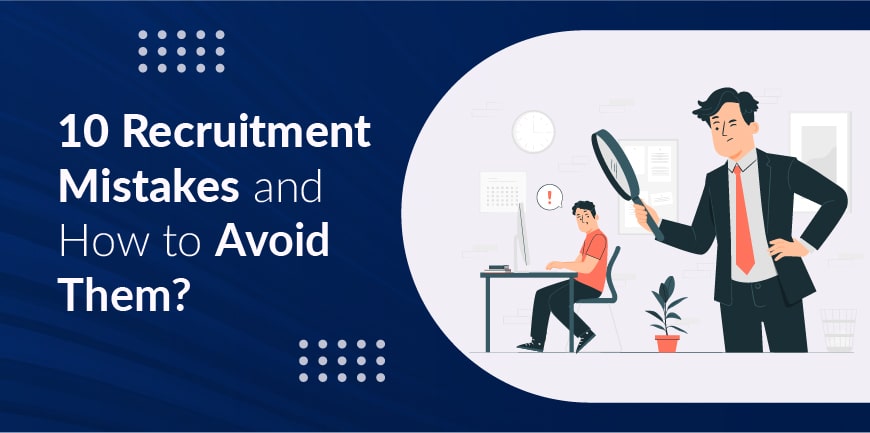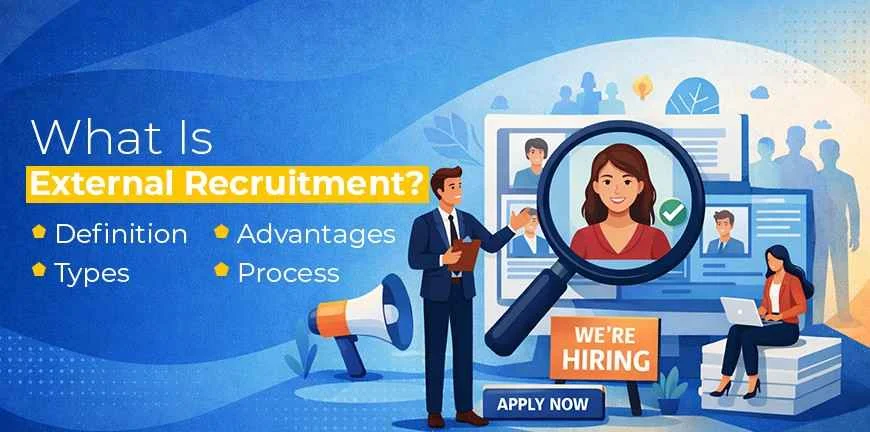
What Is Shop & Establishment Act Compliance? Checklist & Importance
15/05/2025
What Is Mobile Recruiting? Strategies to Hire Faster
19/05/2025Making the right hires is crucial for a business to succeed. However, recruiting the right talent is the most challenging task even for the most experienced recruiters. Recruiters, many times fail to avoid the recruitment pitfalls during the process of hiring candidates. And in today’s competitive environment recruitment mistakes can lead to losing top talent.
What are Recruitment Mistakes?
Recruitment Mistakes are missteps taken by recruiters during the recruitment process, which include not putting up a clear job description, hiring candidates who do not have the right skills/experience, rushing the hiring process, and neglecting feedback among many others. Recruitment mistakes can lead to wasted time, poor hires and additional costs.
What are the 10 Common Recruitment Mistakes?
Here are some of the common recruitment mistakes that recruiter tend to make-
1. Unclear job descriptions
A job description is the very first thing a potential candidate comes across when they are looking to apply for an open role in your company. Not giving clear job descriptions or outlining expectations and responsibilities gives candidates the wrong perspective and organizations end up attracting candidates who are not suitable for the role.
2. Rushing the hiring process
Trying to fill vacant positions very quickly can sometimes lead to hasty decisions. Rushing the process meaning not taking the time to evaluate candidates properly against the job role can result in making wrong hires who don’t fit right into the role or the company culture.
3. Inadequate interview techniques
Not conducting interviews meticulously through a strategic approach can lead to poor hiring decisions. Focussing on surface-level traits or having unstructured interviews can fail to reveal a candidate’s true potential.
4. Unconscious Bias
Unconscious bias can lead to hiring candidates based on unfair or personal preferences rather than their skills, culture fit or qualifications.
5. Ignoring cultural fit assessment
Cultural fit assessment may not seem like such an important thing while deciding whether a candidate is fit for the role, especially if they have the right qualifications and skills. But that’s where you are wrong. In the long run, when you hire someone who doesn’t understand your company culture and refuses to be team player, it can create chaos leading to unprecedented quality.
6. Ignoring internal recruitment
Organizations often overlook existing employees who are skilled, loyal and have the potential to transition to a different role. Neglecting internal talent not only demotivates employees but also presents missed opportunities for the company.
7. Over-reliance on a single job board
Recruiters often over rely on a single job board to get applications from potential candidates. This can be a huge misstep because candidates are spread out and they tend to look for jobs on distinct job boards.
8. Fail to track recruitment metrics
Organizations must pay attention to certain recruitment metrics, if they want to get the best out of the recruitment process, like cost-per-hire, time-to-hire. Failing to do so can fail the recruitment process.
9. Ignoring candidate experience
Recruiters as well as organizations often don’t pay attention to the candidate experience during the recruitment process. But truth be told, no matter how good your company is, a poor candidate experience can harm your brand and lead to losing top candidates.
10. Neglecting reference checks
Often, even organizations tend to take reference checks lightly and treat it more like a formality rather than a necessity. But neglecting this could be one of the biggest recruitment mistakes as you won’t know if in the past the candidate has underperformed or has had conflict of interests etc.
How to Avoid Recruitment Mistakes?
Recruitment pitfalls will occur, but there are ways to avoid these by following certain steps and paying attention to detail. Here is how you can avoid recruitment mistakes.
1. Do not neglect reference checks
Make sure to ask candidates to provide valid references of their previous employer as well as their educational qualifications and take the time to verify them. You can call the previous employer to understand the candidate’s previous experience, nature and behaviour. Verify educational credentials to ensure candidates haven’t misinformed.
2. Conduct phone interviews
Make sure to have a pre-interview with the candidate through a phone call. This interview can help you understand a little about the candidate. For example, if a candidate lists conflict resolution skills, you may infer the meaning and application of this skill, but in a pre-interview, you can ask for clarification.
Some of the pre-interview questions you can ask are-
- How many years of relevant work experience do you have?
- Have you worked in lines of our organization’s subject matter?
- If we hire you, how soon can you start?
- Why are you looking for a job change
3. Write proper job descriptions
Your job description must not only include the job roles and responsibilities but also have information about the company like values, mission, vision. Craft an interesting job description, use keywords that apply to the position and the industry. Your job description must include job title and purpose, duties and responsibilities, preferred skills, company culture, working conditions.
4. Utilise various channels to source candidates
Make sure to not stick to just one job board to put up your job postings. Use social media platforms to create awareness about your open roles, post on networking sites. Use software to streamline the hiring process, create mobile device applications, contact the local newspaper to inquire about adding job listings to their virtual classifieds.
5. Do not rush the hiring process
Take the time to follow the company hiring protocol, and it will definitely help hire the right candidate the first time and avoid having to repeat the hiring process. Although this is time-consuming, it can save time and money in the long run, because you hired someone who aligns well with the needs of the job description. Widen your search, accept more candidates or conduct more interviews until you’re confident in your choice for the role.
6. Listen more speak less
Listen to the candidates as well during the interview. Structure the interview into two parts. The first part must include questions about qualifications and fit of the candidate. If the answers to these questions are not what you expect you can eliminate the candidate.
To ensure you listen more than speak, ask the candidates open-ended questions. You’re more likely to hear longer, developed answers to the questions.
Frequently Asked Questions (FAQs)
1. What are the most common recruitment mistakes?
Some of the common recruitment mistakes made by recruiters include- using unconscious bias, hiring lesser qualified candidates, relying too much on a single job board, rushing the hiring process, ignoring candidate experience.
2. How do you avoid hiring the wrong candidate?
Hiring the wrong candidates can be avoided during the recruitment process if recruiter follow a thorough, well-thought-out approach, use the necessary tools to screen candidates to accurately assess their skills, conduct background checks and interview candidates by asking the right questions.
3. How do you assess cultural fit in recruitment?
A candidate may have the necessary skills and qualifications required for the job role but to assess if they would fit well with the company culture you must ask questions that reveal more about the candidate’s goals, objectives, zeal and interest and check if they align with the company’s values.
4. How does technology help reduce recruitment mistakes?
Technology like AI software can take over the screening process which automatically reduces bias, leading to fair selection of candidates. Tools like ATS can help recruiters manage the applications properly further reducing mistakes.
5. How many people should be involved in the hiring process?
It depends on which role you are hiring for, how important is the role and how big is your company. However not involving more than four or five people is better. Having too many people on your hiring committee can lead to having too many differing opinions.
6. Can AI fix recruitment mistakes?
AI can help enhance human decision-making and therefore avoid recruitment mistakes. Some of the way it can fix the recruitment mistakes are by automating screening reducing bias leading to fair selection of candidates based solely on their skills.
7. How long should the hiring process take?
The hiring process can take anywhere between 1 to 2 weeks ideally. But it also depends on the industry, the role they are hiring for, their response time etc.
Contact Us For Business Enquiry

Amit Saproo
Amit Saproo is the Head of Operations at ALP Consulting with nearly 17 years of experience in Executive Search, RPO, Leadership, and IT & Engineering recruitment. He leads nationwide recruitment programs across Technology, BFSI, and R&D domains, driving strategic hiring solutions for diverse client needs. Amit excels in building and managing high-performance teams that deliver scalable, end-to-end recruitment and consulting services.



